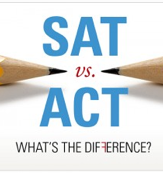Choosing Between the SAT and ACT: 10 Quick Facts

This article – written by teacher, administrator and adjunct professor at Temple University, Dave Bergman, Ed.D. – was reprinted with permission from College Transitions.
We are frequently asked by clients whether they should take the SAT, the ACT, or both. Here are some quick facts that may assist in helping to determine which test is right for you:
- The SAT and ACT cover Math, Reading, and English/Writing; however the ACT also includes Science (kind of). The ACT Science section assesses graph/chart interpretation and reading comprehension, rather than any content knowledge of biology, chemistry of physics.
- Both tests require a strong grasp of arithmetic, algebra, and geometry. However, the ACT also includes more advanced math concepts, such as trigonometry, logarithms, and imaginary numbers. If you haven’t aced your advanced math courses in high school, the SAT Math section may present as the more friendly option.
- There is no penalty for guessing on the ACT. The SAT knocks you ¼ point for every wrong answer making filling in random bubbles a dangerous enterprise.
- The ACT contains longer sections and shorter time intervals, so speed and time management are important to scoring high, especially when it comes to the Science section, which is a downright sprint.
- In the spring of 2016, the SAT will undergo major changes. For example, at present, students can use calculators on the entire SAT math section. In a year and a half, no calculator will be allowed on roughly one-third of the questions.
- In 2016, The College Board will also be scaling back the SAT’s heavy dose of highly obscure vocabulary words (consider lighting a candle for words like propinquity, lachrymose, and blowsy). However, in the short term, the SAT remains more vocab-heavy than the ACTs.
- Is writing a strength or a weakness for you? The SAT has a mandatory writing component; the ACT’s 30 minute essay is optional, depending on which postsecondary institutions you are considering. For example, Stanford, Wabash, American, and Auburn all require the ACT essay, yet the vast majority of schools still deem it optional. To find out if your prospective colleges require the ACT writing, click here.
- Reading comprehension is essential to success on either standardized test. However, the ACT also measures one’s knowledge of grammatical and syntax rules more than its SAT counterpart.
- The SAT is longer in duration (3 hours and 20 minutes versus 2 hours and 55 minutes of actual testing time). Students with attentional problems or learning disabilities sometimes do better with the shorter ACT, although for students taking the essay portion of the ACT, their total time actually be slightly longer than SAT test-takers (3 hours and 25 minutes).
- There is less of a gender gap on the ACT. Girls score almost identically to boys on the ACT, while gender inequity persists on the SAT, with boys holding an advantage. Girls who struggle with the SAT may want to consider giving the ACT a try.
College Transitions’ Take: You should devote the majority of your preparation to either the SAT or ACT, but not before completing a diagnostic exam for each. We advise that you purchase official testing booklets from both the SAT and ACT and then set aside two 5-hour blocks (perhaps on consecutive weekends) to take each test. As much as possible, simulate the conditions you will encounter on test day. After completing both tests, use the booklets to score your exams, and then compare your scores using a concordance table. If you score significantly higher on one test, focus on that test. If scores are similar, choose the test with which you feel more comfortable.
It is in your best interest to take both the SAT and ACT. Schools will take your best score on any of the exams. Even if you score high on the SAT, give the ACT a try (or vice versa). Ultimately, there is no penalty for attempting the other exam, even if your score is lower.
























